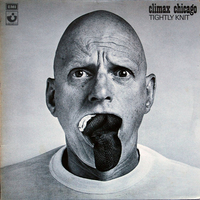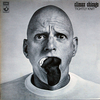Moving onto Tightly Knit, we come to (bar none) the most consistent, entertaining, thought-provoking, and head-scratching record in the entire run. I've heard it a ton of times and cannot compute why it was not a hit, but then again, look at the cover, listen to the music, and it's hard not to understand why it would only appeal to a niche audience. A few tracks here sound like they could have been played on radio at the time, especially "Hey Mama" and "Towards the Sun", which compared to earlier tunes was like a searing ray of Beach Boys-infused sunshine. But elsewhere, their dark sense of humor and often dim outlook on life was on full, unadulterated display.
The second track from this album, "Shoot Her If She Runs", was simply a vicious diatribe on the end of a relationship, bolstered once again by Haycock's dangerous guitar. The only difference was, this time around, CBB was now concerned with one-upping the likes of Ten Years After and Led Zeppelin, and doing it with aplomb. And what about the instrument al "Who Killed McSwiggin", which sounded as if it came out of a movie car-chase scene? We will never know, of course, but just what was the inspiration for this very interesting section of the record? Meanwhile, Cooper sounded downright murderous on the late-night groove "Bide My Time", while the group's humor shone through on the album closer "That's All".
However, as with the previous effort, there is an epic shadow overriding the entire album (including the cover) - "St. Michael's Blues" - which apparently was Pete Haycock's irreverent tribute to Irish blues great Rory Gallagher, by writing a song about his rather colorful socks. However, when you put this fierce, slow-burn blues tune together with the image that is on the cover, it really resonates with the listener - or at least this listener.
Unfortunately, Tightly Knit marked the unconscious end of an era, as CBB from here began to make serious in-roads on the American market. 1972's Rich Man was certainly in the same vein as previous albums but not nearly as progressive, even though it sported a very creative cover. After the 1973 FM Live album, which broke CBB on a lower-to-mid level in the U.S., the old blues-rock days quickly became old hat, and then - irony of ironies - when they finally hit commercial pay dirt it was with "Couldn't Get It Right", a harmonious funk/disco song right at odds with the nascent punk movement in the UK. Sad but true.









Comments